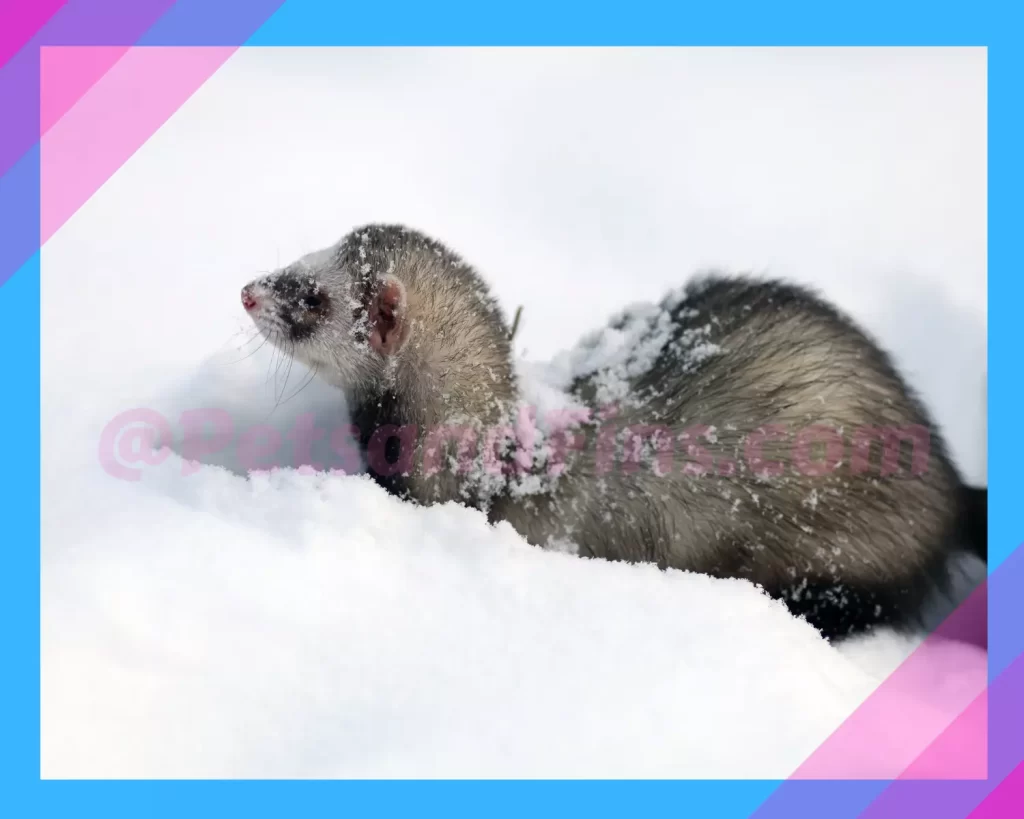Ferrets are adorable little creatures that many people enjoy owning as pets. As with any pet, it is important to understand their needs in order to provide the best possible care for them. One question that often comes up when it comes to ferrets is whether or not they hibernate.
In this post, we’ll take a closer look at the answer to that question and explore other aspects of ferret behavior. So, do ferrets hibernate? The answer may surprise you!
You may be wondering if your ferret will hibernate over the winter months, and I’m here to tell you that they don’t. Ferrets are not true hibernators like some other animals. They do enjoy curling up in a small ball when it’s cold outside, but this is more for warmth than anything else.

If you want your ferret to have an enjoyable winter life, then it is important that you provide them with plenty of food and water, as well as some cozy spots to sleep in during the colder months.
What Exactly Is Hibernation?
Hibernation is a unique state of reduced activity that allows an animal’s body to live off stored energy reserves. It also causes changes in the way their bodies function, including lowered heart rates and breathing, slower metabolism, decreased blood flow to organs, and even lower temperatures for some species.
Hibernation is a winter adaptation and an energy-conservation strategy of animals to deal with challenging climatic conditions. It’s nature’s way of making sure that the animal has enough energy stores to face lean days in preparation for spring.
Hibernating animals are remarkably adept at maintaining normal body temperature while fasting on energy stores. Their metabolic rate drops dramatically-we might say it goes into abeyance or suspends itself until food sources become available again when the weather warms up.
A Few Animals That Hibernate:
- Bats
- Ground squirrels,
- Bears
- Hedgehogs
- Chipmunks
- Wood Frogs
- Box Turtles
- Prairie Dogs

Do Ferrets Hibernate?
Ferrets don’t hibernate, but they do experience changes during the winter season. When the days get shorter, and there’s less light for them, They start to feel lethargic and want to slow down more than usual. They’ll stop playing around as much with you or your other pets in order to conserve energy, and sleep a lot more.
This is usually seen during the winter months when we have less natural light due to all of the snow on the ground and only hours upon hours of night time darkness.
Hibernation is not something that ferrets do. Like most animals, social ferrets huddle together for warmth during the cold winter months, but they are not hibernating.

Ferrets are members of the weasel family, and they do not physically hibernate for a prolonged period of time as other animals do. Hibernation is a process that requires a significant amount of time for chemical changes to occur in the body, signaling to the animal that food will be scarce for an extended period of time, as well as reducing its metabolism as much as possible.
In order for this reaction to take place, the animal must produce white adipose tissue, which provides insulation and sustenance during sleep. Even its digestive system ceases all activity- including eliminating -which is why other animals produce scatable feces before going into deep hibernation.
Ferrets do not have the ability to store that much food in their systems, and they don’t produce white adipose tissue, so they cannot physically hibernate like other animals. Ferrets will sleep more during the winter months, but this is due to less daylight and their wanting to conserve energy. It’s not a hibernation state by any stretch of the imagination.
Whether it is ferrets or other animals, natural selection has created some amazing physiological changes to help these creatures adapt and survive under challenging conditions.

Changes In Ferrets During Winter Season:
There are a few key things to keep in mind when it comes to the changes that ferrets go through during winter. Ferrets will sleep more, but they also need plenty of food and water. Make sure their water dish is not frozen and that you are feeding them a high-quality diet that is appropriate for their age.
Weight Gain : Do Ferrets Gain Weight in Winter ?
If your ferret gains weight during the winter, it is due to an increased amount of food intake. Do not be concerned if they gain a few ounces over the colder months.In the winter, ferrets’ metabolisms change. They don’t do a lot of activity, so they naturally put on more fat to keep themselves warm.
One common concern among ferret owners is that their pet will gain weight during the winter months. This can be a problem, especially if your ferret is already overweight. Be sure to continue providing your ferret with plenty of exercise, and adjust his diet if necessary to help him stay healthy.
Reduced Activity Levels:
Ferrets will reduce their activity levels throughout the winter, but this doesn’t mean they’re sick. Do not worry if your ferret is less active during the cold months; it’s natural for them to sleep more and move around less when it gets colder outside.
Although you might get a little lonely without your ferret’s constant companionship, this is normal behavior for him during the colder months. Ferrets will sleep more to conserve energy, especially if they are allowed to huddle with other ferrets or their favorite humans!

Don’t be concerned about his lack of activity levels; just keep an eye on how much food he eats throughout the winter and adjust his diet as necessary.
With a little bit of understanding, we can make sure our ferrets stay healthy and happy throughout the winter season!
Changes To Their Coats During Winter:
Ferrets will also change the color of their coats during the winter. Their coats turn a few shades lighter and they start developing full face masks.They will start to grow a thicker, fluffier coat that will help keep them warm. Do not shave your ferret’s fur in the winter; this can actually make him colder!
The extra layer of fur will help keep your ferret warm during the colder months, and it is nothing to be concerned about.
Changes In Sleeping Patterns:
Ferrets will also change their sleeping patterns during the winter. They will want to sleep more, and they might be less active overall. This is all normal behavior, so don’t worry if your ferret seems a little out of sorts during the colder months.

Generally speaking, it is normal for ferrets to sleep up to 18 hours a day with a few hours of full blown activity periods in between. This period of sleep can extend beyond 18 hours during the winter months. Some ferret owners have reported that their ferrets have been known to sleep up to 22 hours a day during extremely cold days. Any such changes in sleeping patterns are absolutely normal during the winter season.

How Should You Look After Your Ferret During the Winter?
- Limit Outside Activities: It is recommended that you limit your ferret’s outside activities to a minimum during the cold winter months. Your ferrets need to be made aware, of course, that cold weather has set in. Many ferrets have been known to enjoy winter and snow. However, exposing them to longer periods of extreme cold temperatures can result in a lot of health problems.
- Help Them Sense Winter Has Arrived:It is important that your ferrets are made aware that winter has set in and that they sense the cold season. This is very important for them to undergo the morphological changes that make way for the development of thicker fur on their bodies. It is very important that ferrets undergo this seasonal change.

- Feed High Quality Diet:Ensure that you feed your ferrets a high-quality diet that contains really good levels of fat in it. This is very vital because ferrets tend to put on almost 40 to 60% of their body weight during the winter season. Feeding them a good quality diet is extremely essential in preparing them for the winter season.
- Provide Safe Enclosed Dark Spaces:Provide winter hammocks that are closed to your ferrets during the winter season in their cages. It is very important that your ferrets have such a small safe space where they can peacefully sleep. Straw-based rabbit tunnels also work fantastically during the winter months for your ferret.

If your ferret is staying outside during the winter season, then you have to ensure that you provide a safe, enclosed, heated atmosphere for them. You should also ensure that they live in groups so that they can huddle together and keep each other warm through their body heat.
Wrapping Up
Ferrets are not known to hibernate. They do, however, like to curl up in a ball and sleep for long periods of time, during winter.
Unlike bears or other animals that actually go into an extended period of dormancy during the winter months, ferrets will typically only slow down their activities when it gets cold outside (usually around 10 degrees Fahrenheit).
Ferrets will change the color of their coats during the winter, growing a thicker, fluffier coat to help keep them warm.Their sleeping patterns will also change, with ferrets wanting to sleep more and being less active overall.
To help them stay warm during periods of prolonged inactivity, it is important that your ferret has access to food and plenty of fresh water while it sleeps!
I hope this blog post has answered any hibernation related questions you had about ferrets! If there is anything else I didn’t cover in detail or if you still have more specific questions on this topic, feel free to reach out with your concerns by clicking the contact button below. Our team of experts will be happy to help answer any queries related to ferret behavior and care!
XoXo
Genie

